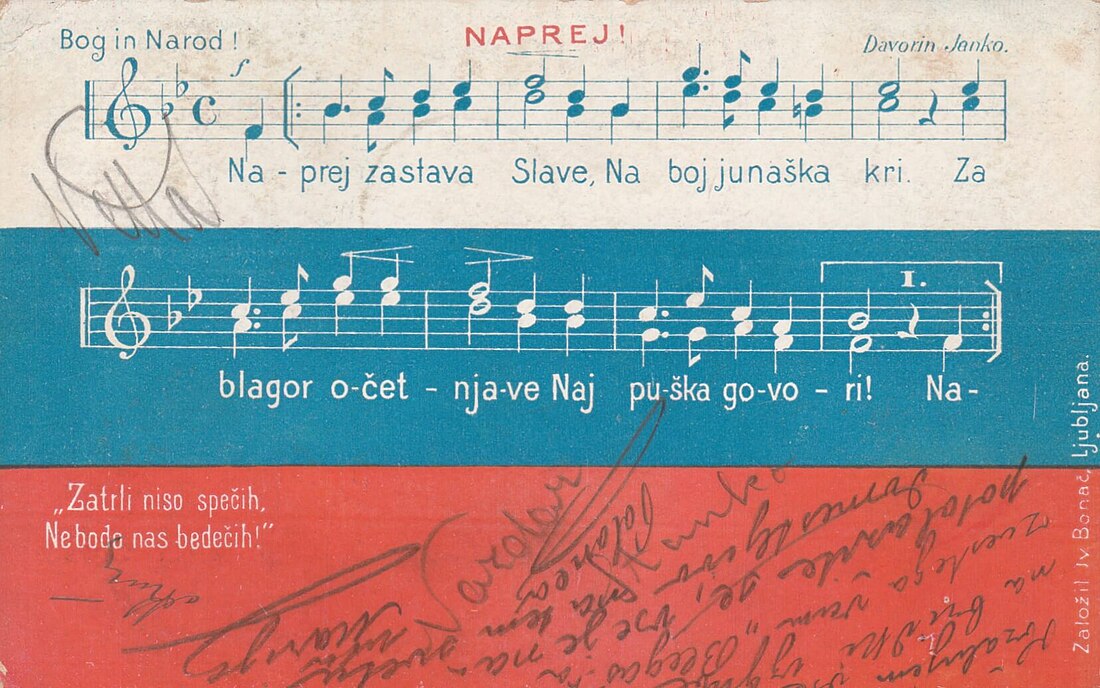"Naprej, zastava slave" or "Naprej, zastava Slave"[notes 1] (Forward, Flag of Glory) is a former national anthem of Slovenia, used from 1860[3][4] to 1989.[5] It is now used as the official service song of the Slovenian Armed Forces and as the anthem of the Slovenian nation.[6]
| English: Forward, Flag of Glory | |
|---|---|
 | |
Former regional anthem of Military anthem of the Song of the Anthem of the | |
| Lyrics | Simon Jenko, 1860 |
| Music | Davorin Jenko, 1860 |
| Adopted | 1860 (as the anthem of Slovenian nation) 1919 (as part of Anthem of Yugoslavia) 1995 (by the Slovenian Armed Forces) |
| Relinquished | 1941 (as part of Anthem of Yugoslavia) 1989 (by Slovenia) |
| Succeeded by | "Zdravljica" |
| Audio sample | |
"Naprej, zastava slave" | |
Lyrics and music
It tells about a boy who goes to defend his homeland, meaning him more than his mother or sweetheart. As such, it is a patriotic recruiting poem.[7] It was the first Slovene literature to be translated into English.[8] The lyrics were written originally by Simon Jenko and then improved collaboratively by him and his cousin Davorin Jenko who also wrote the music.[9] The poem was first publicly sung with great success in front of a large Slavic audience on 22 October 1860, and was first published in Slovenski glasnik (English: The Slovene Herald) on 1 December 1860.[1] In 1863, it was renamed by Radoslav Razlag to Naprej, zastava Slave.[10] In 1885, it became the first poem in Slovene to have been translated into English, under the title "With Slava's Banner, Forward!"[11] The translators were Andrej Jurtela, the first lecturer of Slavic languages at the University of Oxford,[12] and English journalist Alfred Lloyd Hardy, who had a keen interest in music and in Slavic culture.[8] He arranged the melody by Davorin Jenko for piano,[13] wrote an interlinear translation and published it lithographed as an independent publication.[8]
The poem was originally titled "Naprej" ("Forward") and set to music in an inn in Vienna's Prater by Davorin Jenko,[notes 2] who was in anger over the German snub of the Slovene, on 16 May 1860.[9]
History
Part of the national anthem of the Kingdom of Yugoslavia
After the formation of the Kingdom of Serbs, Croats, and Slovenes, the first and the last stanza of the poem were included into the Yugoslav national anthem as its third part, in a medley including the Serb ethnic anthem "Bože pravde" and the Croatian song "Lijepa naša domovino".[14] Even before, during the fight for the northern border, the poem was sung by the Maister's soldiers in November 1918.[7]
Slovene Partisans and Territorial Defence
In World War II, "Naprej, zastava slave" was the introductory melody of the Kričač radio station, emitted by the Slovene Liberation Front,[15] and was a part of the morning and the evening salutation to the flag by the Slovene Partisans.[16] With the establishment of the Federal People's Republic of Yugoslavia in 1946, the royal Yugoslav anthem was replaced by "Hey, Slavs". The first post-war constitution of the People's Republic of Slovenia and the constitution, adopted in 1963, did not specify a regional anthem. "Naprej, zastava slave" was used at official public events and on state holidays since the beginning of the 1970s. In 1989, it was replaced by "Zdravljica".[3]
Because it calls to the defence of the homeland,[13] it was since 1992 played during ceremonial events and oathtaking ceremonies in the Slovenian Territorial Defence in line with the draft Rules on Service in the Territorial Defence, adopted on 15 April 1992.
Current role
It is the current anthem of the Slovenian Armed Forces,[13] based on a government decree from 1995. It is also played (only rarely sung) for the Commander-in-Chief, i.e. the President of Slovenia. The President has, however, the right to delegate this position to another Slovenian citizen.
Lyrics
| Slovenian original | English translation |
|---|---|
Refren: |
Chorus: |
Notes
- Davorin Jenko also composed the Serbian anthem "Bože pravde" (God of Justice) in 1872.[2]
References
External links
Wikiwand in your browser!
Seamless Wikipedia browsing. On steroids.
Every time you click a link to Wikipedia, Wiktionary or Wikiquote in your browser's search results, it will show the modern Wikiwand interface.
Wikiwand extension is a five stars, simple, with minimum permission required to keep your browsing private, safe and transparent.
